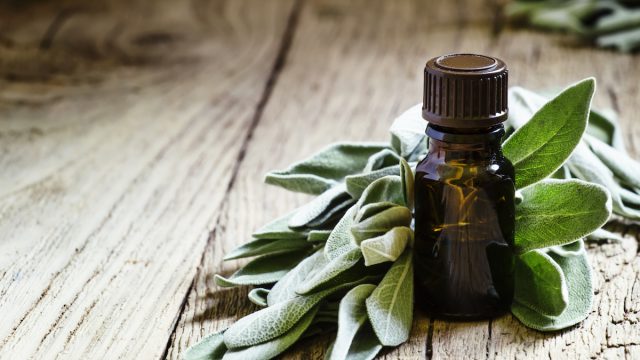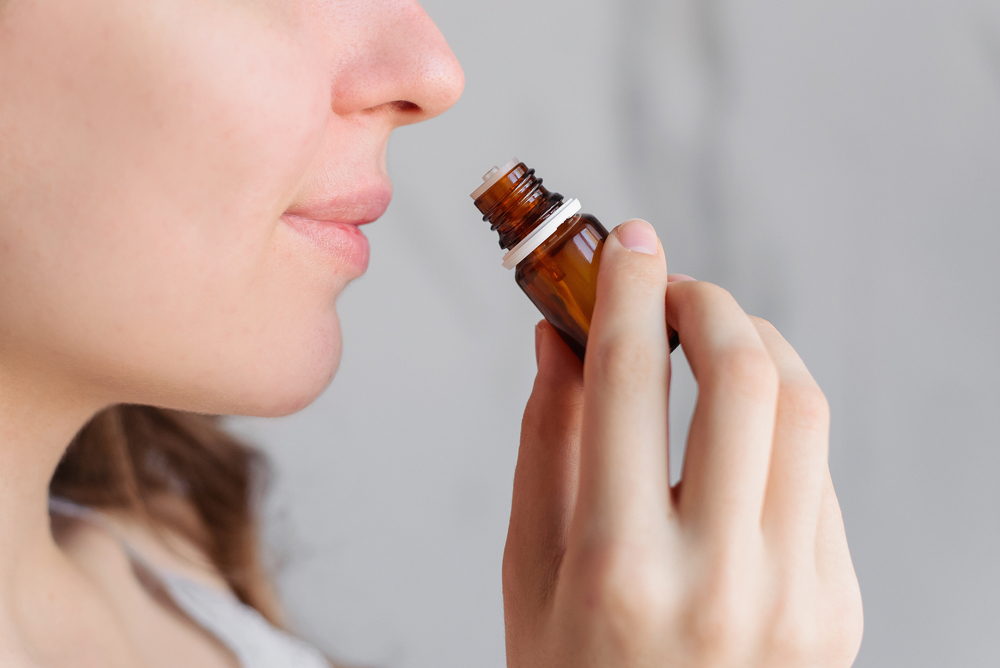4 Ways the Scent of Sage Can Boost Your Mood and Health

Dating back centuries, sage has been used as an herbal remedy for a range of ailments—and to this day, it remains a popular scent in aromatherapy. Though more research is needed to confirm its benefits, some experts say that the scent of sage can help boost your mood and health.
In fact, there are four key benefits to integrating this earthy, herbaceous fragrance into your holistic care routine, whether you light a sage-scented candle, add sage essential oil to your diffuser, or even spritz a bit of a sage-infused perfume on your body.
Read on to learn how the scent of sage is believed to improve your mental and physical wellness, according to holistic health practitioners.
READ THIS NEXT: 6 Scents That Will Help You Relax, According to Aromatherapy Experts.
1
It may reduce inflammation.

Inflammation is an important and natural bodily response to injury or infection that helps you heal. However, when inflammation becomes chronic, it can lead to various health problems, such as arthritis, diabetes, heart disease, and even depression, experts say.
One of the main benefits of sage is its anti-inflammatory effects, says Ketan Parmar, MD, MBBS, a psychiatrist and mental health expert at ClinicSpots.
“The scent of sage can help lower inflammation by stimulating the olfactory system, which is connected to the brain and the immune system. When you inhale the aroma of sage, it can activate certain receptors in your nose that send signals to your brain to modulate your immune response. This can help balance your inflammatory levels and improve your overall health,” Parmar explains.
Jordan Rosewarne, clinician and co-owner at MPR Health, an osteopathic and remedial massage clinic based in Sydney, Australia, adds that sage contains certain antioxidants that are also known to combat inflammation. In particular, he says the rosmarinic acid found in sage may be responsible for the herb’s anti-inflammatory effects.
READ THIS NEXT: The 6 Best Home Scents If You’re Having Guests Over, Experts Say.
2
It may improve memory and cognitive function.

Another key benefit of sage is its positive impact on memory and cognitive function, Parmar says.
“Sage has been shown to enhance memory performance in healthy adults, as well as in patients with mild cognitive impairment or Alzheimer’s disease. Sage can also improve attention, alertness, and mood,” he explains.
Sage achieves these benefits by stimulating the hippocampus, which is the part of the brain responsible for learning and memory formation, Parmar adds.
“When you smell sage, it can increase the activity of neurons in the hippocampus and enhance synaptic plasticity, which is the ability of neurons to form new connections. This can help you retain and recall information better,” he tells Best Life.
For more wellness tips sent directly to your inbox, sign up for our daily newsletter.
3
It may help calm your anxiety.

Another mental health benefit of the scent of sage is that it’s believed to reduce symptoms of anxiety and chronic stress.
“Sage has been used as a traditional remedy for anxiety disorders, such as panic attacks, phobias, and obsessive-compulsive disorder,” says Parmar. “Sage can also lower cortisol levels, which is the hormone that triggers the stress response.”
The psychiatrist adds that the scent of sage can soothe your anxiety by activating the limbic system, which is part of the brain that regulates emotions and behaviors.
“When you breathe in the aroma of sage, it can influence the activity of neurotransmitters, such as serotonin and dopamine, that affect your mood and motivation,” he explains. “This can help you feel more relaxed and confident.”
4
It may improve certain symptoms of menopause.

Finally, the scent of sage may improve certain symptoms of menopause, says Erica Steele, DNM, ND, a board-certified naturopathic doctor with Holistic Family Practice.
“Sage has been traditionally used to alleviate menopausal symptoms such as hot flashes and night sweats,” she tells Best Life. “It contains compounds that mimic estrogen, providing a mild estrogenic effect and potentially reducing the severity of menopause-related discomfort,” she adds.
Though most research touting the benefits of sage for menopause symptoms has focused on ingesting herbal supplements, some experts say that the scent of sage oil can also improve hot flashes.
Healthline suggests “rubbing three drops of diluted clary sage oil across the back of your neck or all over your feet. For even quicker relief, consider adding a few drops to a tissue or napkin and inhaling and exhaling softly,” they advise.
However, experts say that if you plan to integrate sage into your health plan, you should talk to your doctor about how to do so safely.
“While sage can be a part of a holistic approach to health, it should not replace conventional treatments, especially for serious conditions,” says Ryan Sultan, MD, a mental health physician and Assistant Professor of Clinical Psychiatry at Columbia University’s College of Physicians and Surgeons.
“Remember, individual responses can vary, and it’s always important to consider the entire lifestyle when discussing health and wellbeing. That’s the beauty of a holistic and integrative approach—it’s all about the big picture,” Sultan tells Best Life.
Best Life offers the most up-to-date information from top experts, new research, and health agencies, but our content is not meant to be a substitute for professional guidance. If you have health questions or concerns, always consult your healthcare provider directly.